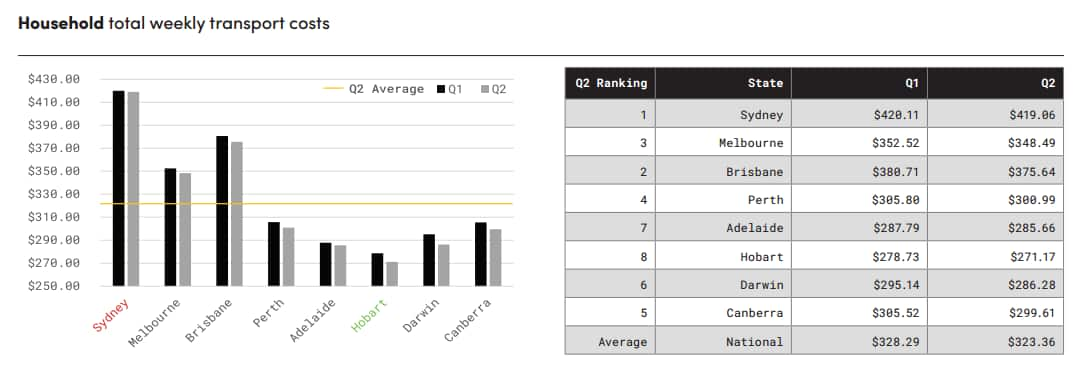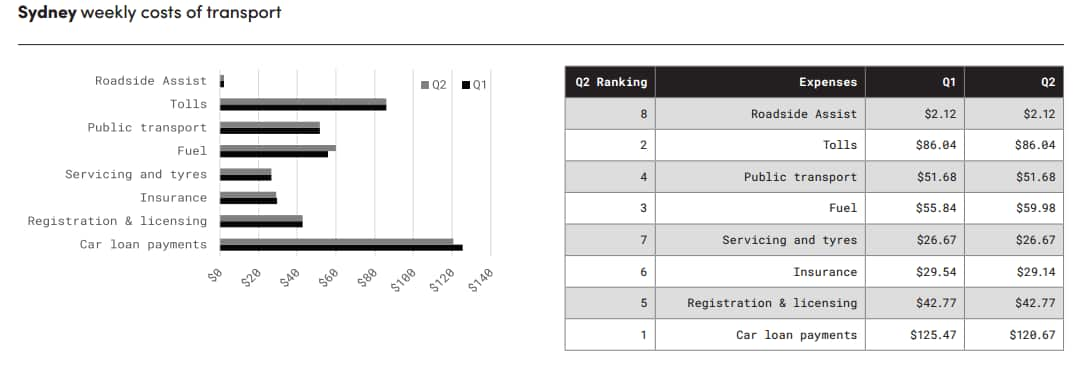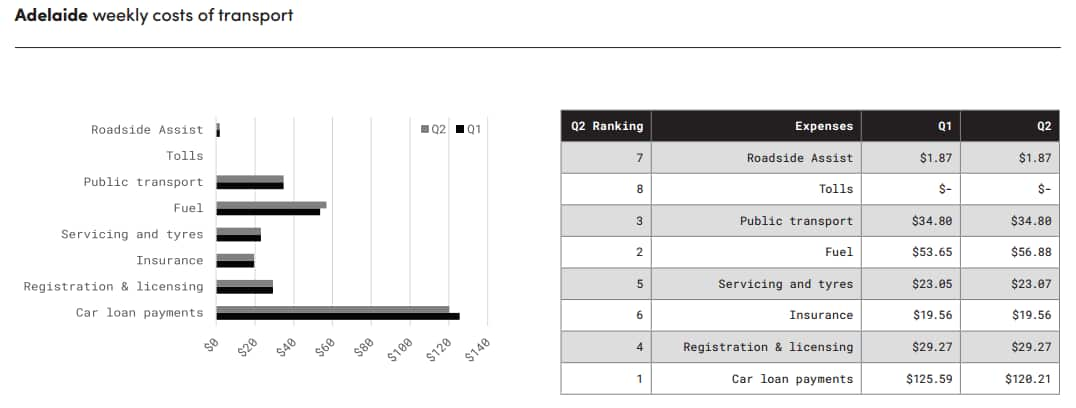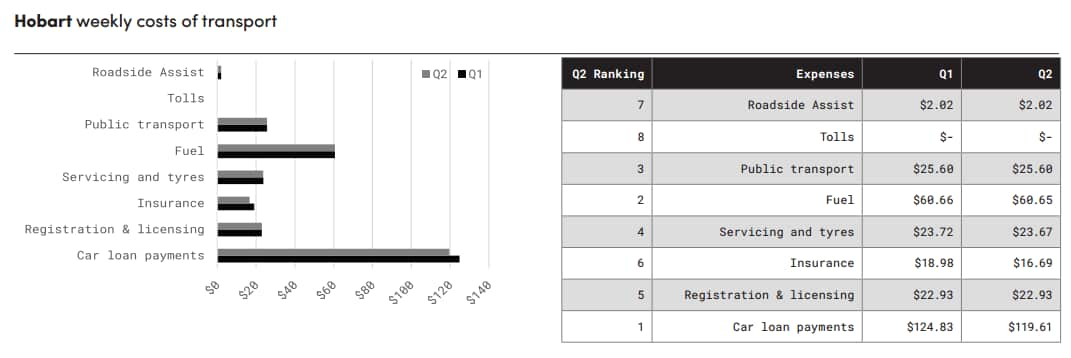Australian families are paying more for their day-to-day transport than for their household utilities and telecommunications combined, the first national Transport Affordability Index has found.
The results, published by the Australian Automobile Association on Monday, calculate the annual cost of taking public transport and owning a car including the cost of tolls, fuel, insurance and registration.
A typical family living in Western Sydney forks out the most for their transport each year at $22,000.
Here’s how the picture looks across the country.
The figures are based on statistics from the first and second quarters in 2016 and are calculated for a hypothetical family of two adults with children and two cars. The family lives in the middle to outer ring suburbs of each of the state's capital cities and one of the adults drives to work while the other catches public transport into the CBD.

New South Wales
Residents of Sydney spend the most amount of money on transport when compared to similar households across the country. A hypothetical family in Sydney would have coughed up $420 a week for motoring and public transport expenses in the first quarter of 2016 and $419 in the second.
If calculated annually, this would amount to $21,700 a year or about 17 per cent of the family’s household income. This compares to $18,000 per annum in Melbourne and $15,000 in Adelaide.
The cost of Compulsory Third Party (CTP) Insurance, vehicle registration and tolls in the city are listed as the leading factors contributing to the high expenses.
In fact, the weekly cost of road tolls in Sydney was found to be the highest in the country, calculated at $86 per week on the assumption that one adult in the household uses toll roads twice a week to commute to the CBD for work.
Meanwhile, in Melbourne and Brisbane it was assumed that one adult used toll roads to travel into the city five days a week, which brought the total cost to $46 and $48 a week respectively.
In Sydney, tolls are only surpassed by car loan payments as the largest weekly expense. These are followed consecutively by fuel, public transport, registration and licensing, and insurance.

Queensland
Households in densely populated capitals such as Sydney, Brisbane and Melbourne were seen to attract the highest transport costs due to the expenses of tolls and public transport.
Brisbane came in second after Sydney as the most expensive capital city for transport with a hypothetical family spending $375 a week in the second quarter of 2016. This would amount to $19,500 a year or 16 per cent of the household’s annual income.
Public transport costs were found to be the highest for the hypothetical family in Brisbane where it costs the household $65 a week to commute on buses, ferries and trains.
This compares to $52 a week in Sydney, $39 in Melbourne and $20 in Darwin.
After car loan payments, public transport factored in as the second-most costly weekly transport expense in Brisbane followed next by fuel and tolls.

Victoria
Melbourne came in as the third most-expensive capital city with the hypothetical family spending $18,000 a year on transport or 14 per cent of their household income.
The cost of comprehensive car insurance was found to cost the most nationally in Melbourne, where it amounts to $30 a week for the family. This is double what similar households pay in Perth but just $1 more expensive than in Sydney.
Car loan repayments, fuel and tolls were calculated as the highest weekly expenses in Melbourne with the total transport expenses of the hypothetical household coming to $348 in the second quarter of 2016.

Western Australia
When it comes to calculating the cost of transport as a percentage of household income, Perth ranks lowest in the country because of the relatively high rates of income in that city.
Just 10 per cent of the hypothetical family’s income is spent on transport in Perth compared to 17 per cent in Sydney and 14 per cent in Hobart.
Car loans in Perth were also found to be the cheapest nationally thanks to marginally lower upfront purchase costs.
In total, the household spent $301 a week in the second quarter of 2016, or $15,700 annually.

ACT
Similarly to Perth, hypothetical households in Canberra spend just over 10 per cent of their income on transport or $15,600 a year.
Registration, CTP and driver’s licence costs in Canberra were found to be relatively high compared to the rest of the country. The average household pays about $38 a week on these expenses compared to Hobart where they total nearly $23.
Sydney was the only capital to top Canberra in this field where registration, CTP and driver’s-licence costs amounted to about $43 a week.

Northern Territory
Maintenance costs associated with the daily use of new and older cars were found to be the most expensive in Darwin.
The hypothetical family’s servicing and tire-replacement expenses in the Northern Territory were calculated to cost close to 40 per cent more than in Melbourne where used-car servicing and tire markets are larger and keep prices lower.
In Darwin, a family spends $286 in the second quarter of this year on transport which amounts to 12 per cent of their annual income.

South Australia
In Adelaide, transport costs the hypothetical household $14,800 a year, making it the second cheapest city nation-wide.
However, when calculating transport expenses as a percentage of income, the South Australian capital ranks fifth.
In terms of affordability, transport in Adelaide is less affordable than in Perth, Canberra and Darwin as it accounts for 13 per cent of the total household income compared to 10, 10.5 and 12 per cent respectively.
Meanwhile, petrol prices in Adelaide were found to be the cheapest in Australia over both the first and second quarters of 2016.

Tasmania
Although transport costs in Hobart are relatively lower than that in higher density capital cities, lower incomes there mean that transport is roughly as affordable as it is in Melbourne and less affordable than Adelaide, Canberra and Darwin.
In Tasmania the hypothetical family spends $14,100 a year on transport which is $7,691 less than the amount estimated for similar households in Sydney.
However, Hobart recorded the highest fuel costs nationally with an average of $60 per week compared to $57 in Adelaide where prices were lowest.


